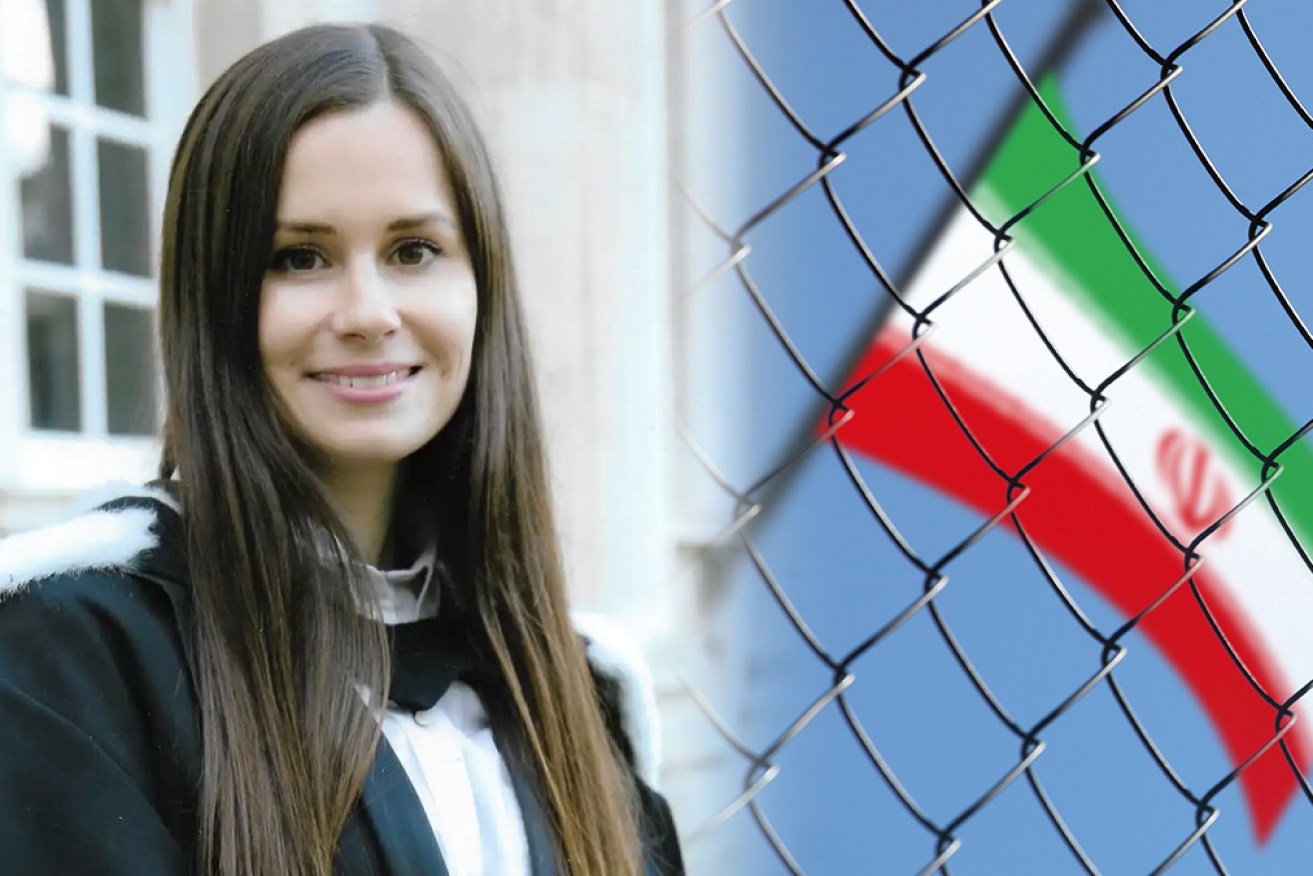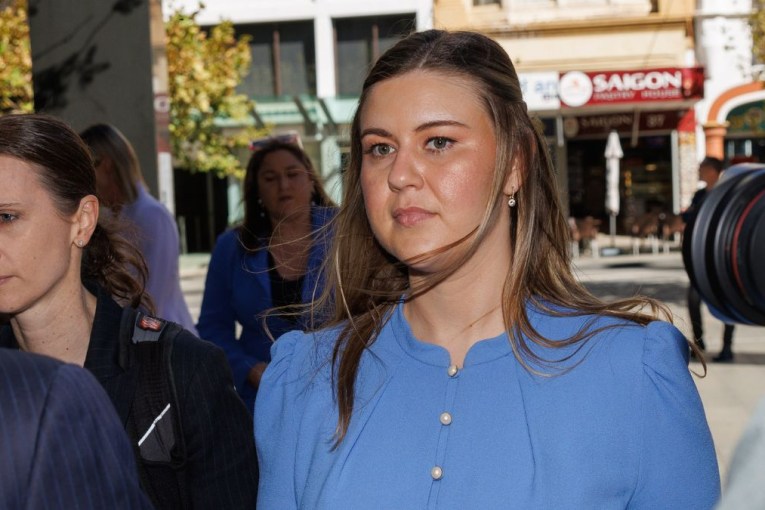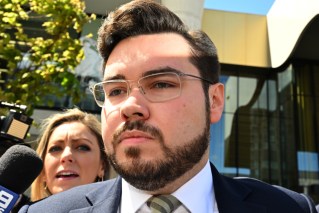‘Free Kylie Moore-Gilbert’: Friends of academic jailed in Iran urge Australian government to act


Kylie Moore-Gilbert has been imprisoned in Iran for two years, and her friends and colleagues are speaking out. Photo: AAP/Getty
Friends and colleagues of imprisoned Australia academic Kylie Moore-Gilbert say her situation is life-threatening and will end disastrously if the Morrison government doesn’t put more pressure on Iran to release her.
The warning comes as Australia’s ambassador to Iran prepares to visit Dr Moore-Gilbert, who had been jailed in Iran for nearly two years before being moved last week to Iran’s notorious Gharchak prison.
A spokesperson for the Department of Foreign Affairs and Trade confirmed that ambassador Lyndall Sachs would be able to visit Dr Moore-Gilbert for the first time on Sunday, insisting the federal government was doing all it could to secure the University of Melbourne academic’s release.
“Dr Moore-Gilbert’s case is one of the Australian government’s highest priorities, including for our Embassy officials in Tehran,” the spokesperson told The New Daily.
“The Iranian government has confirmed that Dr Moore-Gilbert has been moved from Evin to Gharchak Prison (east of Tehran) and has advised that our Ambassador to Iran will be allowed to make a consular visit to her shortly.
“We hold Iran responsible for Dr Moore-Gilbert’s safety and well-being.”
But after two years of staying silent, a group of the Middle East expert’s friends and colleagues has broken ranks with DFAT and Dr Moore-Gilbert’s family, launching a public campaign to demand the Australian government do more to ensure Dr Moore-Gilbert’s safety and secure her release.
The group has launched a Twitter account, and the website freekylie.net.
There is also a petition with more than 30,000 signatures calling on Prime Minister Scott Morrison to bring Dr Moore-Gilbert home.
“We understand quiet diplomacy can work but after two years of being in prison, it’s long in the tooth,” a colleague of Dr Moore-Gilbert’s from the University of Melbourne, who spoke on the condition of anonymity, told The New Daily.
If something hasn’t occurred after two years, you have to question if it will work.
“We are concerned about her health and safety. There are mixed reports. Everything from suicide, to her writing letters saying ‘I just want help getting out of here’. The reports indicate her situation’s not great.”

Dr Moore-Gilbert was moved to the notorious Gharchak prison last week.
The group is calling on the Morrison government to give DFAT the required resources to ensure Dr Moore-Gilbert is safe and that the conditions of her confinement are improved.
“She’s been moved from solitary confinement to what has been reported as one of the worst prisons on the planet which has a laundry list of issues with it,” Dr Moore-Gilbert’s colleague told The New Daily.
“We want her to be in a position where her health, both mental and physical is improved. That will involve regular communication with the ambassador.
We are not trying to convince the government to get her out of jail tomorrow, we think that’s unrealistic. It’s the humanitarian outcome we want.”
The group of friends and colleagues campaigning for Dr Moore-Gilbert’s release wrestled for months over whether to go public with their concerns, as they did not want to upset Dr Moore-Gilbert’s family, who have chosen to remain silent.
“We have reached out to the family, but we haven’t heard back from them,” her colleague said.
“We’re not trying to upset them, that’s not our goal. We’re hoping to work in conjunction with them.”
The New Daily attempted to contact Dr Moore-Gilbert’s family, but was unsuccessful.
An academic jailed
The Cambridge-educated academic had been held in Evin Prison in Iran’s capital for nearly two years after visiting the country for a conference on Shi’a Islam in modern Iran in late 2018.
A rising star in Gulf studies at the University of Melbourne, Dr Moore-Gilbert stayed on in Tehran to conduct academic interviews.
After one of her interviewees reported her to authorities as suspicious she was arrested, tried in secret, and sentenced to serve 10 years for spying – a charge she and the Australian government vehemently deny, and friends and family say couldn’t be further from the truth.
Dr Moore-Gilbert is one of several foreign nationals and dual-citizens currently imprisoned in Iran on charges of spying. Many Iran experts believe the country has taken them hostage to use as bargaining chips in its relations with world powers.
On Tuesday, she was transferred to Gharchak women’s prison, notorious for human rights violations, “as punishment” for purportedly not “cooperating” with authorities, according to prominent lawyer and rights activist Nasrin Sotoudeh, who is herself serving a 38-year sentence at Evin.
In December 2019, the US State Department said that Gharchak Prison met the criteria for “gross human rights violations,” describing it as “an environment that enables rape and murder”.
Inside Gharchak
Amnesty Australia campaigner Rose Kulak told The New Daily the human rights group is concerned for Dr Moore-Gilbert’s welfare, as the prison is among the worst in the world.
“Gharchak is a former industrial chicken farm where women convicted of serious violent crimes are held in unsanitary conditions,” Ms Kulak said.
“There are frequent reports from the facility of assaults against inmates both by other prisoners and by prison staff.
“This is placing Kylie in physical danger as well exposing her to the risk of infectious diseases.
In letters smuggled out of Evin prison last year, Dr Moore-Gilbert wrote that she felt “entirely alone” and that her “physical and mental health continues to deteriorate”.
Adding to the concern around her condition are reports that she has been tortured.
Reza Khandan, the husband of lawyer Nasrin Sotoudeh, said Dr Moore-Gilbert was able to contact him to say the conditions at the prison were awful.
“I cannot eat anything, I am very disappointed, I am so very depressed,” he reported her as saying.
Ms Kulak said the allegations of neglect and torture were deeply concerning.
“Kylie should at the very least be provided with regular access to her family through telephone calls, to a lawyer of her own choosing and to consular assistance, as a well as being given all the medical care she needs,” she said.
“Allegations of torture and other ill-treatment – including prolonged solitary confinement – must be immediately investigated and those suspected of responsibility brought to justice.”
Vice-Chancellor Duncan Maskell of the University of Melbourne described Dr Moore-Gilbert’s prison transfer as “worrying and deeply distressing to her family, friends and her university colleagues”.
“The safety and welfare of our colleague continues to be our absolute priority and we hope she can remain strong and healthy,” Dr Maskell said.
“We are in close contact with Dr Moore-Gilbert’s family and will continue to provide the ongoing support and assistance they need during this extremely distressing time.”








